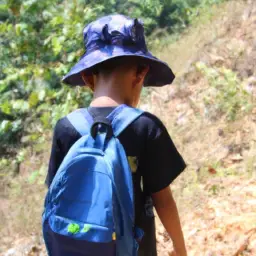Are you looking for ways to raise resilient children who can navigate life’s challenges with ease? Grit and social skills are two crucial factors that can help your child become more resilient.
Grit is the ability to persevere through difficult situations and overcome obstacles while social skills involve the ability to communicate effectively, build relationships, and work collaboratively with others.
By developing these skills in your child, you can help them become more resilient and better equipped to deal with the ups and downs of life.
To build grit in your child, you’ll need to provide them with opportunities to practice perseverance and resilience. This might involve setting achievable goals, encouraging them to take risks, and providing them with support and encouragement as they work towards their objectives.
Similarly, developing social skills requires creating a supportive and positive environment where your child can build relationships with others, develop empathy, and learn how to communicate effectively.
By fostering these skills in your child, you can help them become more resilient and better equipped to deal with the challenges they’ll face throughout life.
Key Takeaways
- Providing opportunities for practice is crucial for building grit and social skills.
- Teaching the growth mindset can help children view mistakes as opportunities for growth.
- Developing strong social skills involves effective communication, empathy, conflict resolution, and emotional regulation.
- Fostering positive relationships and creating a supportive environment are essential for teaching important social skills.
Understanding Grit and Social Skills
We’re exploring how grit and social skills play a crucial role in raising resilient children. Understanding grit and social skills is essential for parents as they can positively impact a child’s development.
Grit refers to the ability to persevere and stay committed to a goal despite facing obstacles and setbacks. On the other hand, social skills enable children to interact positively with others, communicate effectively, and form healthy relationships.
Both grit and social skills are critical to a child’s success in life. Children who possess these traits tend to be more resilient, confident, and better equipped to handle challenges.
As a parent, you can foster grit and social skills in your child by providing opportunities for them to practice these skills. Encouraging them to take on challenges, praising their efforts, and modeling positive social behaviors are practical tips for raising resilient children.
Ultimately, understanding the importance and benefits of grit and social skills in parenting can help you raise a child who is well-prepared to face life’s challenges.
Building Grit in Children
If you want to build grit in your children, here are some key points to keep in mind.
First, encourage perseverance and persistence. This means helping your child to set goals and work towards them, even when things get tough.
Second, teach the growth mindset. Help your child to understand that their abilities can be developed through hard work and practice.
Finally, allow for failure and mistakes. Let your child know that it’s okay to make mistakes and that they can learn from them.
Encouraging Perseverance and Persistence
You can help your child develop perseverance and persistence by providing opportunities for them to practice overcoming challenges and setbacks. This can be done through goal setting techniques and celebrating small victories. Setting achievable goals will help them learn to break down larger tasks into smaller, more manageable steps. Celebrating small victories along the way will help them feel motivated and encouraged to keep working towards their ultimate goal.
To help your child build perseverance and persistence, you can create a table that outlines their goals and progress. This will provide a visual representation of their achievements and encourage them to keep going. In the first column of the table, list the goals your child wants to achieve. In the second column, write down the steps they need to take to achieve each goal. In the third column, track their progress by checking off each step as they complete it. In the fourth column, celebrate their small victories by writing down a reward or positive reinforcement they will receive for completing each step. By using this table, you can help your child stay focused and motivated on their journey towards achieving their goals.
Teaching the Growth Mindset
When teaching your child about the growth mindset, it’s important to emphasize that their abilities and intelligence can be developed through hard work, effort, and perseverance.
Encourage them to view their mistakes and failures as opportunities to learn and grow, rather than signs of inherent flaws or limitations. Teach them to set realistic goals and break them down into manageable steps, and to celebrate their progress along the way.
Fostering a positive mindset can also involve modeling positive self-talk and reframing negative thoughts. Encourage your child to use affirmations and visualization techniques to build confidence and overcome self-doubt.
Help them to see setbacks as temporary and focus on the progress they have made.
By teaching your child about the growth mindset and fostering positivity, you can help them develop the resilience and grit needed to face life’s challenges with confidence and perseverance.
Allowing for Failure and Mistakes
Encouraging a growth mindset requires acknowledging that failure and mistakes are inevitable, and that they’re valuable opportunities for learning and growth.
Embracing failure means understanding that it’s a natural part of the learning process, and that children need to feel comfortable making mistakes to grow. By creating a safe and supportive environment where mistakes are accepted and even encouraged, you can help your child develop a positive attitude towards failure.
Learning from mistakes is also a key component of building resilience. Instead of focusing on the negative outcome, encourage your child to reflect on what went wrong and what they can do differently next time.
This process helps them develop problem-solving skills and gives them the confidence to try again. It’s important to remember that success isn’t always immediate, and that it often takes multiple attempts to achieve a goal.
By teaching your child to embrace failure and learn from mistakes, you’re equipping them with the resilience and perseverance they need to succeed in life.
Developing Social Skills in Children
You can help your child develop strong social skills by teaching them how to communicate effectively and empathize with others. Encouraging positive relationships with family, friends, and peers can also go a long way in fostering healthy social development.
Additionally, promoting collaboration and teamwork through group activities and projects can help your child learn how to work well with others and build important social skills.
Teaching Communication and Empathy
One way to help your child develop strong communication and empathy skills is by modeling these behaviors in your own interactions with others. When you actively listen to others and make an effort to understand their perspective, your child will learn the importance of paying attention to what others have to say and respecting their opinions.
Additionally, teaching emotional regulation and conflict resolution skills can help your child learn how to communicate their feelings effectively and resolve conflicts in a peaceful manner.
It’s important to remember that communication and empathy skills are not innate abilities and need to be developed over time. As a parent, you can help your child develop these skills by practicing them yourself and creating opportunities for your child to practice them as well.
By consistently modeling these behaviors and providing guidance and support, you can help your child grow into a resilient individual who is capable of communicating effectively and empathizing with others.
Encouraging Positive Relationships
Building positive relationships with others can bring joy and fulfillment to your child’s life. As a parent, you can encourage your child to build friendships by creating opportunities for socialization. Here are a few ways to help your child form positive relationships:
- Encourage participation in group activities, such as sports teams or clubs.
- Host playdates with classmates or neighbors.
Model positive social behavior and communication skills. Teach conflict resolution and how to apologize when necessary.
By fostering positive relationships, your child will develop important social skills that will benefit them throughout their life. They’ll learn how to communicate effectively, empathize with others, and work collaboratively towards common goals.
In addition, by helping your child navigate conflicts and disagreements, you’re teaching them a valuable life skill. Conflict resolution involves listening to others’ perspectives, expressing oneself in a respectful manner, and finding a solution that works for everyone involved. By teaching your child how to resolve conflicts, you’re helping them build stronger relationships and become more resilient individuals.
Promoting Collaboration and Teamwork
Now that you’ve learned about encouraging positive relationships, let’s talk about promoting collaboration and teamwork. These skills are crucial in both personal and professional settings, and it’s never too early to start developing them in our children.
One effective way to do this is through collaborative activities that require working together towards a common goal. This can be as simple as a family game night or as involved as a community service project. Not only do these activities teach children how to work with others, but they also foster a sense of responsibility and accountability to the group.
Of course, with collaboration comes the potential for conflict. It’s important to teach children how to handle disagreements and resolve conflicts in a respectful and constructive manner.
This can be done through role-playing scenarios, where you guide your child through a hypothetical conflict and model appropriate behavior. It’s also helpful to establish clear guidelines for conflict resolution, such as taking turns speaking and using contraction’s instead of blaming language.
By teaching these skills early on, you’re giving your child the tools they need to navigate challenging situations in a positive way.
Creating a Supportive and Positive Environment
To foster resilience in your children, it’s important to create an environment filled with positivity and support. This means creating safe spaces where your children feel comfortable expressing their emotions and nurturing their emotional intelligence.
It’s important to listen to your children and validate their feelings, even if you don’t necessarily agree with them. By doing this, you’re showing your children that their emotions matter and that you value their opinions.
Another way to create a supportive and positive environment is by celebrating your children’s successes, no matter how small they may be. This can be as simple as praising them for completing a task or achieving a goal.
It’s also important to model positive behavior and attitudes, as children often learn by example. By demonstrating optimism and a can-do attitude, you’re teaching your children to approach challenges with a positive mindset.
Overall, creating a supportive and positive environment is key to raising resilient children who are able to navigate life’s challenges with confidence and strength.
Modeling Resilience and Grit
By showing your children how to bounce back from setbacks and persevere through challenges, you’re inspiring them to overcome obstacles and achieve their goals. Role modeling is the best way to teach your kids the importance of resilience and grit.
Here are 4 ways to model resilience and grit:
-
Share your own stories of perseverance. Let your children know that you’ve faced challenges and setbacks in your life, but you never gave up. Talk about the strategies you used to overcome those obstacles.
-
Encourage intentional practice. When your children are struggling with a particular skill, show them how to practice intentionally. Set goals, break the skill down into smaller parts, and celebrate progress along the way.
-
Emphasize the power of a positive attitude. Model a can-do attitude and encourage your children to see setbacks as opportunities to learn and grow.
-
Foster a growth mindset. Teach your children that their abilities can be developed through hard work and dedication. Encourage them to take on challenges and remind them that mistakes are a natural part of the learning process.
By modeling resilience and grit, you’re not only teaching your children important life skills, but you’re also showing them how to approach challenges with a positive attitude and a growth mindset.
Fostering Independence and Responsibility
Encouraging your kids to take responsibility for their actions can lead to a sense of autonomy and self-reliance that will benefit them throughout their lives. By instilling accountability early on, you are teaching your children to become independent thinkers and self-starters who can make decisions for themselves. This doesn’t mean that you should let them run wild; rather, it means finding a balance between guiding them and letting them learn from their mistakes.
One way to encourage autonomy is to give your children age-appropriate tasks and let them take charge of their own responsibilities. For example, you can assign them chores around the house or let them make their own decisions about what to wear for the day. This will help them develop a sense of ownership and pride in their accomplishments. Additionally, when they make mistakes, it’s important to hold them accountable for their actions. This will teach them that their choices have consequences and that they are responsible for their own behavior.
| Encouraging Autonomy | Instilling Accountability | Benefits of Developing Independence |
|---|---|---|
| Giving age-appropriate tasks | Holding children responsible for their actions | Self-reliance |
| Allowing children to make decisions | Teaching consequences of actions | Ownership and pride |
| Finding a balance between guiding and letting them learn | Developing independent thinking | Better decision-making abilities |
Frequently Asked Questions
How do I know if my child has enough grit and social skills?
If you’re wondering whether your child has enough grit and social skills, there are a few ways to assess their development.
For grit, consider whether your child is able to persevere through challenges and setbacks, and whether they have a growth mindset that allows them to learn from failures.
To assess social skills, observe how your child interacts with others and whether they are able to communicate effectively, show empathy, and navigate conflicts.
Nurturing these skills in everyday life can involve encouraging your child to take on challenges and supporting them through setbacks, as well as providing opportunities for socialization and teaching them how to communicate and problem-solve effectively.
By focusing on these areas, you can help your child develop the resilience they need to succeed in life.
Can grit and social skills be taught or are they innate qualities?
Teaching grit and social skills can be an effective way to help your child become more resilient. While some people may have a genetic predisposition towards these qualities, research suggests that they can be developed through intentional practice and reinforcement.
One effective method for teaching grit is to encourage your child to set goals and work towards them, even when faced with obstacles or setbacks. Similarly, social skills can be developed through activities that require collaboration and communication, such as team sports or group projects.
Ultimately, the nature vs nurture debate is complex, but by providing your child with opportunities to practice and develop these skills, you can help them become more resilient and better equipped to handle the challenges that life may throw their way.
How can I balance fostering independence with providing support for my child?
When it comes to fostering independence in your child, it’s important to find a balance between autonomy and parental guidance.
Providing support doesn’t mean doing everything for your child, but rather giving them the tools and resources they need to succeed on their own.
Encourage them to make their own decisions and take responsibility for their actions, while still being available to offer advice and guidance when needed.
It’s also important to remember that every child is different and may require different levels of support and guidance.
By finding the right balance and fostering independence, you can help your child develop resilience and the skills they need to succeed in the future.
What are some common mistakes parents make when trying to build grit and social skills in their children?
When it comes to building grit and social skills in your child, there are some common mistakes that parents often make. One of the biggest mistakes is overprotectiveness, which can prevent your child from developing the resilience they need to face challenges.
Another mistake is a lack of consistency, which can lead to confusion and frustration for your child. However, there are strategies you can use to build grit and social skills in your child. Encouraging risk-taking can help your child learn to take on challenges and push themselves outside of their comfort zone.
Promoting empathy can also help your child develop the social skills they need to navigate relationships and work effectively with others. By avoiding common parenting mistakes and using effective strategies, you can help your child develop the resilience and social skills they need to succeed.
How can I help my child develop resilience in the face of adversity or failure?
To help your child develop resilience in the face of adversity or failure, it’s important to focus on building their self-esteem through social support and nurturing their ability to learn and grow from failure.
One key way to do this is by emphasizing the importance of effort over natural ability, and encouraging them to take on challenges even if they might fail.
When they do encounter setbacks, it’s important to provide emotional support and help them see the situation as an opportunity for growth rather than a reflection of their inherent worth.
By building resilience through failure and nurturing self-esteem through social support, you can help your child develop the skills they need to overcome obstacles and thrive in life.
Conclusion
Congratulations! You’ve learned about the importance of grit and social skills in parenting and strategies for raising resilient children.
To build grit in your child, encourage them to set goals, practice perseverance, and embrace challenges. Developing social skills in children involves teaching them how to communicate effectively, empathize with others, and build positive relationships.
Creating a supportive and positive environment for your child is crucial in fostering their resilience. This involves providing emotional support, setting clear expectations, and praising effort over outcome.
Modeling resilience and grit yourself is also important in encouraging your child to develop these qualities.
Finally, fostering independence and responsibility in your child will help them become self-sufficient and better prepared to face challenges in the future.
Keep practicing these strategies and you’ll be on your way to raising a resilient and successful child.














































































































